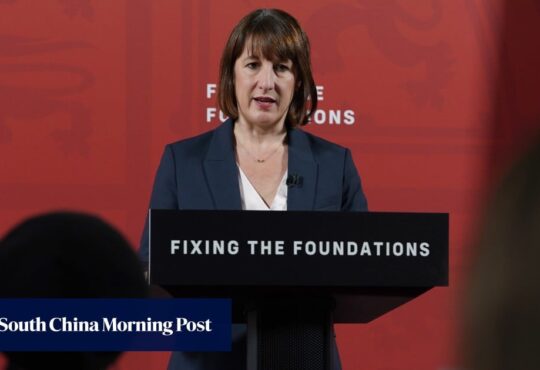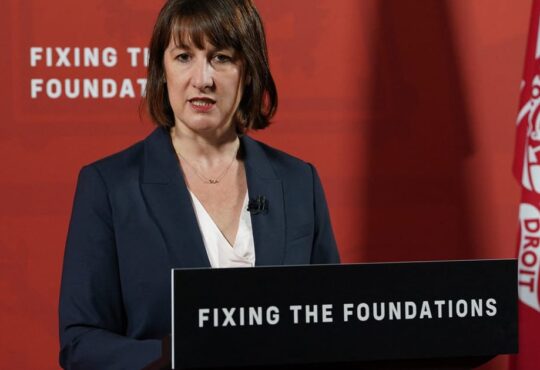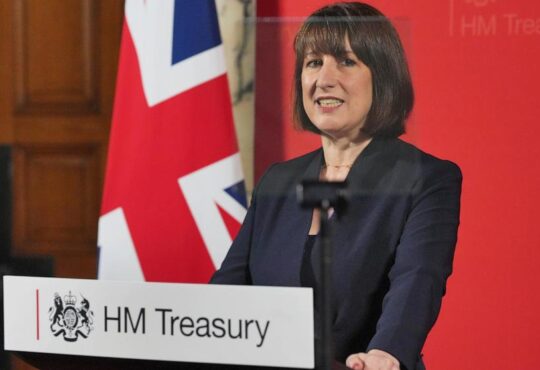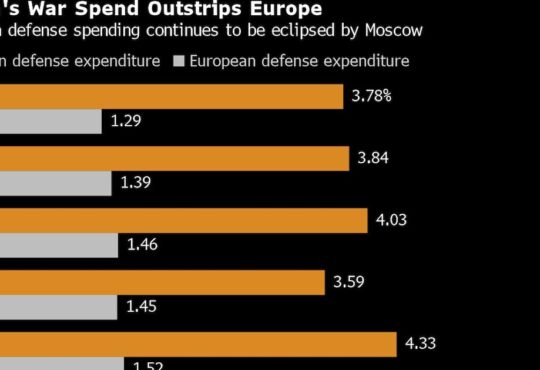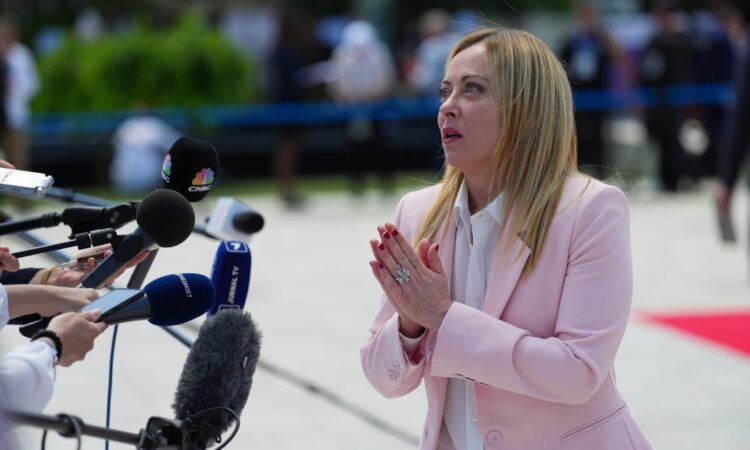
Press play to listen to this article
Voiced by artificial intelligence.
ROME — At the end of NATO’s annual summit in Vilnius in July, Italian Prime Minister Giorgia Meloni wound up her press conference abruptly. It had nothing to do with the reporters’ questions, she said: her high heels were killing her.
A complaint of that kind at such a hothouse of masculine energy as a NATO summit would have been unimaginable for a previous generation of female leaders, who found it essential to project a tough exterior.
But the supportive reaction on social media, particularly from women, and sympathetic reporting on women’s sites, suggested her aside had reinforced her image as a leader who’s down-to-earth and relatable. It also served as a reminder of the unfair standards that women are held to, an obstacle that Meloni has had to overcome on her path to the top.
The fact that real women find Italy’s premier authentic is one of the reasons for her high approval rating of 53 percent. One-quarter of women who voted in last September’s election chose Meloni’s party, more than any other, according to polling analysts Demopolis.
Her hard-right party, Brothers of Italy, has surged in the polls since the elections and now stands at 29 percent, mostly at the expense of groups led by her male coalition partners, Matteo Salvini, and Silvio Berlusconi, who died in June.
Meloni’s election marked a long-overdue moment change for Italian politics. “In Italy, a taboo has been broken,” said Marina Terragni of feminists Radfem Italia, pointing to the fact that the opposition Democratic Party elected its first female leader, Elly Schlein, soon afterward.
But after nine months in office, Meloni has divided observers over whether her victory has marked a breakthrough for Italian women more broadly. Women are underrepresented in both Meloni’s parliamentary party and within her cabinet.
She won approval from some women for measures on prevention of domestic violence, such as faster trials and tougher sentences for offenders, as well as increases to child benefit, and linking unemployment benefits to children. “She has put motherhood at the center of politics,” said Terragni.
But opposition politicians claim that many of Meloni’s policies discriminate against women indirectly.
Staying at home
A list compiled by Gilda Sportiello, an MP for the 5Star Movement, includes the axing of unemployment benefits for those theoretically able to work, of which women with young children were the main beneficiary, and tax breaks that the opposition argues incentivize low-earning women to stay at home. Meloni is opposed to a minimum wage, which would principally benefit women.
Until recently, women could access their pension with fewer years of contributions than men, but Meloni’s government is restricting these rights.
Italy’s €190 billion, EU-funded pandemic recovery plan cites improving gender equality, including in women’s participation in the labor market, as one of its priorities. This has been historically a weakness for the country.
To this end, the previous government allocated more than €3 billion from the fund for nursery construction, which could help Meloni work toward her manifesto promise of free nursery places for all.
But Italy is late with the selection of projects, and had to negotiate with the EU to avoid losing funding. The government blames the previous administration for the delay.
With the windfall of the EU funds, Italy has a historic opportunity to address inequality. “For once Italy has the means to change things,” said Valeria Manieri, founder of Le Contemporanee, which opposes gender discrimination.
“But if she misses this opportunity, and there are no funds for nurseries and services, and low salaries and women’s employment are not tackled, this would certainly be a failure for Italy’s first female prime minister.”
In the run-up to the election, despite assurances from Meloni, there were fears that she would seek to weaken the constitutional provisions for abortion, which is permitted within 90 days, under certain conditions.
But while Meloni has so far not touched the so-called 194 law which legalized abortion, members of her coalition have drafted a law giving legal standing to the fetus from conception, which would indirectly make abortion illegal.
‘Abortion is not a right’
When her equal opportunity minister Eugenia Roccella said in a TV interview that “abortion is not a right,” it was indicative of the government’s aims, Sportiello, the 5Star MP, said.
Even if Meloni does not dismantle civil rights on issues such as abortion, such talk is dangerous, in Sportiello’s view. “Language is powerful — it moves the country in the wrong direction and opens up these fundamental rights to discussion. Women in this country are afraid where this wind could take us, afraid of losing their rights.”
While Meloni is careful to present herself as a moderate on the world stage, at home her government has introduced ideological policies, throwing a bone to her core voters on the far-right.
The government ordered local authorities to stop registering same-sex couples as parents, leading to the removal of some women from their children’s birth certificates. The government argues it is only following a ruling of the constitutional court.
For Manieri, of Le Contemporanee, this is “unacceptable” and “could lead to an avalanche effect.”
The persecution of minorities “opens a tap,” legitimizing wider discrimination, agrees 5Star MP Sportiello, pointing to the suspension of an entire school class who verbally abused a gay teacher in Emilia Romagna.
ITALY NATIONAL PARLIAMENT ELECTION POLL OF POLLS
Loading…
For more polling data from across Europe visit POLITICO Poll of Polls.
At times, Meloni divides feminists. While younger women such as Manieri oppose the criminalization of surrogacy, Terragni, the radical feminist, approves of the law as preventing the exploitation of women. Meloni recognizes motherhood “cannot be reduced to a transaction,” Terragni said. While she said she didn’t vote for Meloni, she praised the government’s “strong’ resistance to so-called “woke” language, in contrast to more traditional allies on the left.
Last month the teenage son of Meloni’s close ally and party co-founder Ignazio La Russa was accused of rape.
When La Russa, Speaker of the Senate, the most senior position of state after the president, said he believed his son and blamed the alleged victim for taking drugs, it created one of the trickiest moments for Meloni’s premiership so far.
Roccella, the minister for equal opportunities, defended him, saying he spoke as a father.
Meloni said “as a woman” she “tended to sympathize with the victim.” But for Sportiello, she did not go far enough, and the incident was an expression of this government’s retrograde attitude to women. “That Meloni did not condemn him, that he was protected, sends a message. In another government he would have to apologize.”
When the party has grown so fast and struggles to find enough high-caliber individuals to fill important posts, such scandals are inevitable, Manieri claims. “If you appoint personalities with a certain pedigree to government or to the institutions, it’s likely that you get caught out by statements that are improbable, bizarre, offensive, or by institutional gaffes.”
The Meloni effect will inevitably be played out ahead of the European elections next year. Female leaders such as Ursula von der Leyen and Roberta Metsola, noting the relative stability of Meloni’s government, have been surprisingly supportive, seeking to bring her inside the tent of European center-right politics.
Meloni leads the European Conservatives and Reformists Party, who are being courted by the European People’s Party and could be highly influential in a more right-leaning EU. If next year’s European Parliament election delivers the predicted right-wing surge, women living far beyond the borders of Italy will feel Meloni’s sway.


